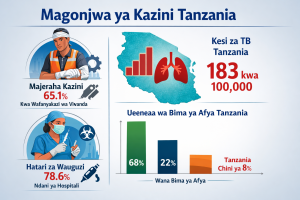
Quality Has to Matter; Kenya’s Imperative for International Trade Success Amidst Product Recall Incidents
Inexcusable Blunders
Kenya’s call for increased compulsory consumption of local music and entertainment content is perhaps the most conspicuous divergence the country has had in prioritizing the economics of quality products and services. Despite her efforts to embrace capitalism and the exchange of goods and services in a free market setting where quality is key, Kenya continues to perform dismally in prioritizing this aspect as a core demand factor. The last two years of the country’s international trade have been characterized by rejected goods due to unmet quality standards raising questions on the nation’s commitment to improving its balance of trade metrics.
In August 2023, nearly 100,000 pairs of children’s jeans manufactured in Kenya were recalled by both the United States and Canada due to choking hazard risks with customers expecting a refund to the tune of $2.6 million. In 2020, the European Union temporarily banned about 11 Kenyan companies from supplying their economies after the flagging of fresh produce containing harmful chemicals with increased surveillance on local producers. Closer home in 2024, Rwanda recalled Fluconazole 200mg tablets manufactured in Kenya after showing signs of pink discoloration raising more questions about the production standards in Kenya. This was followed by a declaration by the Nigerian education minister that the country was adding Kenya to a list of countries, including Uganda, Benin, and Togo, where a proliferation of dubious degrees is common raising questions on the institutional integrity of the nation in enhancing standards and compliance.

Characterizing Cross-Border Trade Standards
In 2021, the AfCFTA signed a memorandum of Understanding with the African Organization for Standardization (ARSO) to spearhead the development, harmonization, adoption, and publication of African standards under which trade in goods and services will take place. This characterizes the need to prioritize quality standards in driving cross-border exchanges across the country if the continent is to realize the dream of a singular market. Equally, the EAC SQMT Act of 2006 makes provisions for ensuring standardization, quality assurance, metrology, and testing of products traded within the region to ensure industrial development and trade while protecting the health and safety of consumers and the environment. This is in addition to multiple other international and local standardization frameworks designed to ensure the quality of products and services trade across the globe which Kenya is hellbent on ignoring.
The repercussions of these incidents extend beyond immediate financial losses and consumer dissatisfaction. They cast a shadow on Kenya’s credibility as a reliable trading partner, threatening its potential for increased participation in international markets. The AfCFTA, which aims to create a single market for goods and services across the African continent, and the EAC, fostering regional economic integration, necessitate a firm commitment to high-quality production standards. Kenya’s ability to thrive in these dynamic trading blocs depends on its capacity to assure its partners of the safety and reliability of its products.
Urgent Attention
The recent developments are not isolated incidents but rather characterize the challenge that the country faces in protecting consumers from unsafe products, both locally and internationally. It is therefore a symptom of broader issues that warrant urgent attention from concerned stakeholders, including the Kenya Bureau of Standards and Consumer Protection agencies and organizations.
“To thrive in international trade, Kenya must prioritize the quality of its products, ensuring that they adhere to globally accepted standards.”
Equally, Kenya’s manufacturers must prioritize quality control measures throughout the production process. This includes stringent checks on raw materials, vigilant monitoring of manufacturing processes, and rigorous testing of finished products. Collaborative efforts between the government, industry stakeholders, and international organizations can play a pivotal role in developing and implementing effective quality assurance mechanisms.
Kenya must invest in strengthening its regulatory framework to ensure that all products meet international safety and quality standards. Enhanced surveillance on local producers, coupled with stricter enforcement of regulations, will go a long way in preventing such incidents from tarnishing the nation’s reputation on the global stage.
Further, the incidents raise questions not only about the immediate health risks associated with consumables but also about the broader implications for Kenya’s budding industries. To thrive in international trade, Kenya must prioritize the quality of its products, ensuring that they adhere to globally accepted standards. This demands investments in research and development, robust testing procedures, and transparent communication channels to address emerging issues promptly.
Notably, the reputation of Kenya’s education system is intricately linked to the nation’s standing in international trade. To address this, Kenya needs to undertake a comprehensive review of its education sector, implementing measures to enhance the credibility of its degrees and certifications. Collaborating with regional partners and international organizations to develop and uphold rigorous accreditation standards will be crucial in rebuilding trust.
Quality is King
As Kenya strives to position itself as a key player in the AfCFTA and the EAC, it must recognize the interconnectedness of quality standards and international trade. By addressing the root causes of these incidents and implementing robust quality control measures, Kenya can build a solid foundation for sustainable economic growth and increased participation in global markets. The nation’s success in international trade, particularly within the AfCFTA and EAC, hinges on its ability to instill confidence in its trading partners. By investing in comprehensive quality assurance mechanisms, strengthening regulatory oversight, and collaborating with international stakeholders, Kenya can pave the way for a future where its products are synonymous with reliability, safety, and high quality.
Muoki Musila is an Kenyan based economist. These are the writer’s own opinions and do not necessarily reflect the viewpoints of Liberty Sparks. Do you want to publish in this space? Contact our editors at [email protected] for further clarification.



